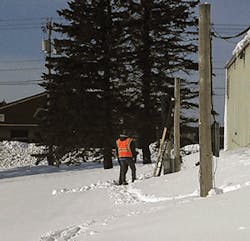
What’s the Best Measurement of Field Technician Productivity?
We all have at least 1 boss, and we must be accountable for our work. That said, telecom field techs have unique struggles — as do their managers.
I know this from firsthand experience, as I’ve gone from technician to manager and back to technician more than a few times. Just from experience, I can tell who is doing their job well, and who is not, by spending a little time with them. Ask me how to quantify that knowledge and scale it to a large service provider — and I am at a loss for an answer.
Forty years ago, the first level supervisors had performed the jobs that they managed. They saw every technician every day. They showed up on the jobsite during the operation. AND, they had time to inspect at least 1 job a week and provide a full quality report for every technician. Sure, jobs-per-day were measured, but quality was king. After all, everything we did was supposed to last 30 years.
InvisiLight® Solution for Deploying Fiber
April 2, 2022Go to Market Faster. Speed up Network Deployment
April 2, 2022Episode 10: Fiber Optic Closure Specs Explained…
April 1, 2022Food for Thought from Our 2022 ICT Visionaries
April 1, 2022Fast forward to today, and one first level supervisor might have an entire state. I personally worked with a beleaguered first level manager who managed every CO technician in Iowa for a major provider. In a year, I saw the man only 2 times: when I interviewed for the job, and when I left the company. This, despite the guy working 16-hour days with outage responsibilities 24/7. How can anybody manage quality and productivity under those circumstances?
Again, being on both sides, I see this issue from both sides.
Technician Perspective
"The people measuring my performance have no clue what it takes to do the job," an unnamed technician shared with me a time ago. That is probably true. Most technicians will not take a management job anymore because they are paid better and have much less stress in their current tech role. That leaves people with Accounting degrees deciding how long it should take to find a fault problem the size of a dime in a 100-mile fiber run.
"My expected productivity prevents me from ever doing a stellar job," shared another. That resonates as well. If you see a pedestal open on your route, you don’t stop to close it even though you know a family of rats will soon take residence and you’ll end up back there when there is an outage. You just don’t have time to be proactive.
Management Perspective
To be fair, we also have to look at the manager’s perspective.
For example, sometimes a tech can be at the CO for 2 hours and never actually enter the building. Yes, this happens.
Because direct management is so sparse, the bad apples will take advantage of not being supervised. Too many people work harder at getting out of work than if they just did their jobs.
Managers also deal with something called the Taillight Principle. That means some techs who are hitting their productivity numbers are not really fixing the full scope of the problem. As long as the service is working when the subscriber sees the taillights of the technician leave the driveway, it’s all good. Unfortunately, later their managers must send a second tech out to finish the job.
Managers also face the challenges of managing technicians they never see.
The last time I managed a crew, I was averaging 100 emails a day, and 50 of them had "very important" in the title. Conference calls, reports, and new practices that changed every week, made it nearly impossible to get out of the office. When I could untether from the office, I had to drive 6 hours to see a technician and show an ID badge just so the techs could know who I was. Just a quick chat after shaking hands did not develop mutual trust.
One manager I know asked I have fewer technicians, lower budget and less control than I’ve ever had. How in the world can I make improvements? In general, you can’t. If performance is as good this year as it was last year, you are doing a great job.
The Latest Answer
GPS is supposed to be the answer. With it, managers can now track:
• Location
• Time at location
• Truck idle time
• Speed
• Lane changes
• Traffic lights ran
• Tech in the driver’s seat or not
There are also times when activity is misrepresented. Techs are often flagged for truck idle time because they are in the air and their bucket truck must be running or the bucket won’t work. One tech I knew was flagged because his hazard lights wouldn’t come on unless the key was on. The guy was doing his job, but the GPS system algorithms showed he was not.
Abusing idle time is another example of how the bad apples are hurting everybody. Some techs have been guilty of leaving their trucks idling all day when there is no good reason for it.
Concerning truck idle time: a little bit of common sense will go a long way. If you are working in -0 degrees F temperatures, a warm truck can prevent frostbite and general hypothermia. When it is 107 degrees F outside, the air conditioning in the truck can prevent heat stroke.
The Real Solution
The industry-expert columnists at ISE magazine are famous for offering solutions to problems. I always try to do the same, but I’m unable to on this subject.
Based on my experience, the techs that do a good job always have and always will. The bad apples will find a way around any system designed to make them good technicians. Again, they will work harder at getting out of work than doing their jobs.
Like this Article?
Subscribe to ISE magazine and start receiving your FREE monthly copy today!
I believe that management, the unions, and the technicians, must take a hard look at themselves. There is plenty of guilt to go around. If the bad apples are removed from the tree, average productivity will go up across the board. Then, management can, and will (I hope) set productivity expectations that are representative of the real world. This would include avoiding one-size-fits-all expectations. The technology in LA and in Dubois, WY, is generally the same. What it takes to make it work is completely different.
If you have any ideas on how to fix this problem, let me know, and I will share them in this column. If you have other subject matter suggestions, please send them in.
About the Author

Vernon May
Vernon May is the Chief Technologist and Founder of Vernon May Solutions. He is an expert in OSP and ISP Operations, and focuses on new technology introduction, from marketing and sales to design enhancement to training to product approval. Along with writing a column for ISE magazine, he also hosts seminars available throughout the country.
For more information, call Vernon at 1.319.238.0285, email: [email protected], visit https://www.vmaysolutions.com/, and follow him on Twitter @Vernonmay13.





